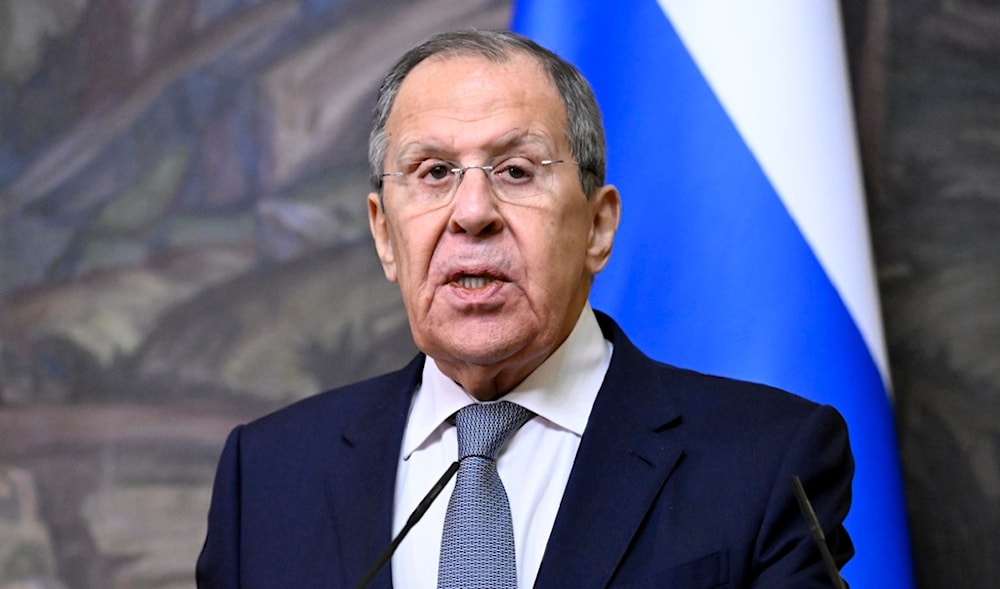Gaza ceasefire implementation facing challenges, Lavrov says
The Russian foreign minister discusses the challenges facing the second phase of the Gaza ceasefire, dialogue with Syria, and accusations regarding the Libyan conflict.
-

Russian Foreign Minister Sergey Lavrov attends a joint news conference with his Armenian counterpart following their meeting in Moscow, Russia, Tuesday, on Jan. 21, 2025. (AP)
Moscow reported challenges in implementing the ceasefire agreement between Hamas and the Israeli occupation in Gaza, according to Russian Foreign Ministry Sergey Lavrov.
"We are already receiving signals that there will be problems with the second stage [of the ceasefire] and have probably already begun," Lavrov said, relaying that Israeli circles are dissatisfied with the way Hamas is fulfilling its obligations throughout the first phase.
He also noted gaps in the ceasefire implementation, highlighting the ongoing killings of Palestinians despite the agreement. He compared the Palestinian death toll to that of the Ukrainian-Russian war, saying the latter was "two times less in ten years on both sides."
According to the Palestinian Ministry of Health in Gaza's statistical report, published on Monday, the death toll from the ongoing Israeli assault has risen to 47,518, in addition to 111,612 injuries since October 7, 2023. The report also noted that many victims remain trapped under the rubble and on the roads, where rescue teams are unable to reach them.
According to the Russian diplomat, establishing a Palestinian state would allegedly eventually normalize the occupation's relations with the Arab world, noting that the so-called "two-state" solution is backed by all external parties, including the Biden administration.
In contrast, Lavrov also highlighted that while the Trump administration did not clarify its stance on this issue, it promoted the normalization agreements and recognized "Israel’s" control over the occupied Golan Heights, reversing the 2002 Arab initiative calling for a Palestinian state based on UN resolutions.
He further clarified that the peace initiative was initially proposed by Saudi Arabia and approved by the Arab League and the Organization of Islamic Cooperation. "So, we can say that the establishment of a Palestinian state would lead to the reestablishment of Israel’s relations with the entire Islamic world, at least, this is what comes from the decisions I have just mentioned," he assumed.
Read more: Hamas delegation to visit Russia for MFA meeting
Poor dialogue with Syria, the West and the Libyan conflict
Regarding relations with Syria, Lavrov expressed concerns about Syria's new leadership under transitional President Ahmad al-Sharaa, noting that "dialogue and understanding are not very good."
He emphasized the need for active and constructive national dialogue, prioritizing the future of the Syrian people over geopolitical gains.
Lavrov also criticized efforts to exclude Russia, China, and Iran from supporting the Syrian settlement, suggesting such actions reflect the West’s intent to sideline its competitors.
Furthermore, Lavrov dismissed the accusations from Western countries blaming Russia for sustaining the conflict in Libya.
"By the way, Western diplomats, including those in the Middle East countries, accuse Russia that national dialogue in Libya cannot start, because there are Russian forces there. And this, according to the words of Western diplomats ... is the root of all the current Libyan problems. But this does not surprise anyone because the West is used to ruining something, creating crises, and then seeing what happens," Lavrov said.
Lavrov also criticized the current UN mediation in Syria, slamming it as ineffective, and expressed optimism that the new African representative would foster greater trust in the political process.
"There are also problems in Libya, of course, where the West and the East cannot come to a common denominator on how to further develop the political process, while the special representative of UN Secretary-General [Antonio Guterres] is not very transparent and not effective at all, let us admit it," Lavrov said.
Read more: Danish raids in 2011 Libya killed civilians, kept secret by Denmark

 4 Min Read
4 Min Read








